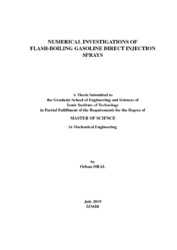Please use this identifier to cite or link to this item:
https://hdl.handle.net/11147/7365| Title: | Numerical Investigations of Flash-Boiling Gasoline Direct Injection Sprays | Other Titles: | Kaynayan Benzinli Doğrudan Enjeksiyonlu Spreylerin Sayısal Olarak İncelenmesi | Authors: | Oral, Orhan | Advisors: | Barışık, Murat Çelik, Hasan |
Keywords: | Internal combustion engines Gasoline Direct Injection GDI injector |
Publisher: | Izmir Institute of Technology | Source: | Oral, O. (2019). Numerical investigations of flash-boiling Gasoline Direct Injection sprays. Unpublished master's thesis, İzmir Institute of Technology, İzmir, Turkey | Abstract: | Gasoline Direct Injection (GDI) system is a new technology that is the combination
of injection in diesel engines and ignition in gasoline engines. Comparing with
the conventional methods of injection, it has many advantages including, fuel economy,
higher engine power, lower engine knock tendency, NOx and cold-start HC emission
rates. The operation of the GDI engine is affected by the processes of fuel injection,
spray atomization and vaporization, charge cooling, air/fuel mixture preparation, and incylinder
charge motion. Therefore, numerical modeling has an important role to improve
all these factors affecting the engine.
This thesis focuses on numerical analyses of the fuel sprays injected into a constant
volume chamber by a single hole GDI injector under flash-boiling and non-flashboiling
conditions. The aim of this thesis is to develop a numerical model that can be
used in flash-boiling spray simulations and to validate the results of the numerical model
against experimental data in terms of spray angle and spray penetration. Initially the GDI
sprays were simulated by the standard spray simulation model of OpenFOAM solver
package that was tuned for gasoline injections. Then the model was modified for both
non-flashing and flashing spray simulations and the results were compared with experimental
ones. It is concluded that; discharge coefficient and spray initial angle have critical
impacts on the numerical results. Benzinli doğrudan enjeksiyon (GDI) sistemi, dizel motorlardaki enjeksiyon ve benzinli motorlarda ki ateşlemenin birleşimidir. Konvansiyonel enjeksiyon yöntemleri ile karşılaştırıldığında, yakıt ekonomisi, daha yüksek motor gücü, daha düşük motor vuruntu eğilimi, NOx ve soğuk başlatma HC emisyon oranları gibi birçok avantajı vardır. GDI motorunun çalışması yakıt enjeksiyonu, püskürtme atomizasyonu ve buharlaştırma, soğutma, hava/yakıt karışımı hazırlığı ve silindir içi hareketlerden etkilenir. Bu nedenle, sayısal modelleme, motoru etkileyen tüm bu faktörleri iyileştirmek için önemli bir role sahiptir. Bu tez, kaynama ve normal koşullar altında tek delikli bir GDI enjektörü ile sabit bir hacim haznesine enjekte edilen yakıt spreylerinin sayısal analizini içermektedir. Bu tezin amacı, kaynayan sprey simülasyonlarında kullanılabilecek sayısal bir model geliştirmek ve deneysel verilere karşı nümerik modelin sonuçlarını sprey açısı ve sprey penetrasyonu açısından doğrulamaktır. Başlangıçta GDI spreyleri, OpenFOAM’ın benzin enjeksiyonları için ayarlanmış standart sprey simülasyon modeli ile simüle edilmiştir. Daha sonra model, hem kaynayan hem de normal püskürtme simülasyonları için modifiye edilmiş ve sayısal analiz sonuçları, deneysel veri ile karşılaştırılmıştır. Sonuc¸ olarak; deşarj katsayısı ve sprey başlangıç açısı, sayısal sonuçlar üzerinde kritik etkilere sahiptir. |
Description: | Thesis (Master)--Izmir Institute of Technology, Mechanical Engineering, Izmir, 2019 Includes bibliographical references (leaves: 74-81) Text in English; Abstract: Turkish and English |
URI: | https://hdl.handle.net/11147/7365 |
| Appears in Collections: | Master Degree / Yüksek Lisans Tezleri |
Files in This Item:
| File | Description | Size | Format | |
|---|---|---|---|---|
| T002012.pdf | MasterThesis | 7.26 MB | Adobe PDF |  View/Open |
CORE Recommender
Page view(s)
356
checked on Apr 21, 2025
Download(s)
460
checked on Apr 21, 2025
Google ScholarTM
Check
Items in GCRIS Repository are protected by copyright, with all rights reserved, unless otherwise indicated.